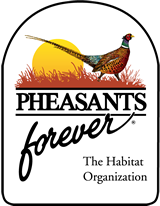
Photo: Members of the National Youth Leadership Council pose for a quick picture between meetings in the Capitol building. Included (from left to right) are Jared Austin of Kansas, Wyatt Fornstrom of Wyoming, Emma Smith of Maryland, Alex Winter of Iowa, and Kyle Holden of Wisconsin.
Washington, D.C. – April 28, 2017 – Pheasants Forever & Quail Forever chapter volunteers from nine states, including next generation leaders from the organization’s National Youth Leadership Council, traveled to Capitol Hill this month to meet with U.S. representatives regarding 2018 Farm Bill priorities. These sportsmen and women advocated for a stronger Conservation Reserve Program (CRP) to protect and strengthen the nation’s water and wildlife resources, while supporting America’s farming and ranching communities.
“From plummeting pheasant, quail, pollinator, and monarch populations to degraded water quality across America, grassland habitat is the nexus to it all,” explained Dave Nomsen, vice president of governmental affairs for Pheasants Forever & Quail Forever. “This is why we’re proud to showcase our volunteers in Washington; men and women working side-by-side with our nation’s producers who can carry their message for stronger Farm Bill programs to representatives in Congress.”
Local leaders of Pheasants Forever & Quail Forever – representing the states of Minnesota, Kansas, Iowa, Texas, Michigan, Pennsylvania, Wyoming, Maryland and Wisconsin – participated in more than 25 meetings with members of Congress and various agencies to showcase the nation’s overwhelming demand for CRP and working lands programs. At the top of the list, a stronger, 40-million-acre Conservation Reserve Program as part of the soon-to-be-debated Farm Bill was highlighted by the various volunteers.
“I feel honored to represent such a great organization with so many important goals regarding conservation,” stated Wyatt Fornstrum, president of Pheasants Forever & Quail Forever’s National Youth Leadership Council. “This experience changed my perspective on how government works and how people work together more than I would have thought. I actually felt I connected when talking with members of Congress about the Farm Bill.”
Pheasants Forever & Quail Forever’s 2018 Farm Bill Priorities
Conservation Reserve Program (CRP)
- Restore a CRP authorization to 40 million acres
- Modernize the CRP application and signup processes. Future signups should target larger blocks of habitat and reflect the “historic” distribution of CRP during 1990-2010 when more than 32 million acres were enrolled nationwide.
- Implement dynamic CRP transition strategies for expiring contracts. Provisions supporting additional working lands programs focused on long-term and permanent natural resource protection should be developed. A strategy to assist farmers and ranchers with opportunities for grazing, cover crops, organics, and other agriculture production systems should be considered.
- To improve Bobwhite Quail populations and associated habitat, future CRP should prioritize planting and managing native vegetation. This includes expanding and creating conservation practices and programs that have frequent disturbance encouraging early successional habitats, increase incentives for pine tree thinning, and promote prescribed burning.
Environmental Quality Incentives Program (EQIP)
- Expand funding for EQIP and increase funds used for wildlife conservation practices to 10 percent. We strongly support the successful Working Lands for Wildlife Program. It showcases the successful Sage Grouse Initiative in the West, Lesser Prairie Chicken Initiative in the Southern Great Plains, and eastern forest initiatives focusing on improving habitat for the Golden-Winged Warbler and Bobwhite Quail.
Agricultural Conservation Easement Program (ACEP)
- Pheasants Forever & Quail Forever supports funding of at least $500-million per year.
Voluntary Public Access and Habitat Incentives Program (VPA-HIP)
- This program provides habitat improvements and supports public access for America’s hunters and anglers and should be continued at no less than $150-million over five years.
Conservation Technical Assistance (CTA)
- CTA funds are leveraged with local partner funds to deliver USDA conservation programs and provide technical support for farmers, ranchers and landowners. We support a robust funding level that ensures efficient and effective conservation program implementation that result in multiple benefits.
Sodsaver and Conservation Compliance
- Pheasants Forever & Quail Forever supports continuing these provisions to protect native habitats. The result is a balanced working lands ecosystem that consists of agricultural production systems and conservation.
About Pheasants Forever & Quail Forever
Pheasants Forever and Quail Forever is the nation’s largest nonprofit organization dedicated to upland habitat conservation. Pheasants Forever and Quail Forever have more than 149,000 adult and youth members, and 720 local chapters across the United States and Canada. Chapters are empowered to determine how 100 percent of their locally raised conservation funds are spent; the only national conservation organization that operates through this truly grassroots structure. Since creation in 1982, Pheasants Forever has spent $708 million on 517,000 habitat projects benefiting 15.8 million acres nationwide.
Pheasants Forever is dedicated to the conservation of pheasants, quail and other wildlife through habitat improvements, public awareness, education and land management policies and programs.








